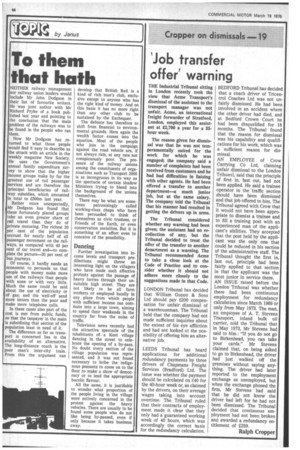'Job transfer offer' warning
Page 46

If you've noticed an error in this article please click here to report it so we can fix it.
THE Industrial Tribunal sitting in London recently took the view that Acme Transport's dismissal of the assistant to the transport manager was not unfair. Acme, an international freight forwarder of Stratford, London, employed this assistant at £2,700 a year for a 35hour week.
The reason given for dismissal was that he was not temperamentally suited for the work for which he was engaged; the company said a number of complaints had been received from customers and he had had difficulties in liaising with other agents. He had been offered a transfer to another department—a much junior job, but at the same salary. The company told the Tribunal that his manner had resulted in getting the drivers up in arms.
The Tribunal considered whether any warning had been given; the assistant had no recollection of any, but the Tribunal decided to treat the offer of the transfer to another denartment as a warning. The Tribunal recommended Acme to take a close look at the Code of Practice and to consider whether it should not adhere more closely to the suggestions made in that Code.
LONDON Tribunal has decided that William Guppy 8.E. Sons Ltd should pay £200 compensation for unfair dismissal of a warehouseman. The Tribunal held that the company had not made sufficient inquiries about the extent of his eye affliction and had not looked at the possibility of offering him an alternative job.
LEEDS Tribunal has heard applications for additional redundancy payments by three drivers of Chapmans Freight Services (Bradford) Ltd. The issue was whether the payment should be calculated on £40 for the 40-hour week or, as claimed by the drivers, on their average wages taking into account overtime. The Tribunal ruled that their contracts of employment made it clear that they only had a guaranteed working week of 40 hours, which was accordingly the correct basis for the redundancy calculation. BEDFORD Tribunal has decided that a coach driver of Tricentrol Coaches Ltd was not unfairly dismissed. He had been involved in an accident where the other driver had died, and at I3edford Crown Court he had been disqualified for 18 months. The Tribunal found that the reason for dismissal was his capability and qualifications for his work, which was a sufficient reason for dismissal.
AN EMPLOYEE of Crow Carrying Co Ltd, claiming unfair dismissal to the London Tribunal, said that the principle of first in, last out, had not been applied. He said a trainee operator in the traffic section should have been dismissed and that job offered to him. The Tribunal agreed with Crow that it would not have been appropriate to dismiss a trainee and to fill a training post with an experienced man of the applicant's abilities. They accepted that the post held by the applicant was the only one that could be reduced in his section of the administrative staff. The Tribunal thought the first in, last out, principle had been fairly applied to that section in that the applicant was the most junior in service there. AN ISSUE raised before the London Tribunal was whether there had been continuous employment for redundancy calculation since March 1969 or only from May 1973. The man, an employee of A. T. Stevens Transport, inland bulk oil carrier, told the Tribunal that in May 1973, Mr Stevens had said to him : "If you do not go to Birkenhead, you can take your cards." Mr Stevens claimed that, on being asked to go to Birkenhead, the driver had just walked off the premises without saying anything. The driver had later reported to the employment exchange as unemployed, but when the exchange phoned the firm, Mr Stevens had said that he did not know the driver had left for he had not been dismissed. The Tribunal decided that continuous employment had not been broken and awarded a redundancy entitlement of £259.








































































































